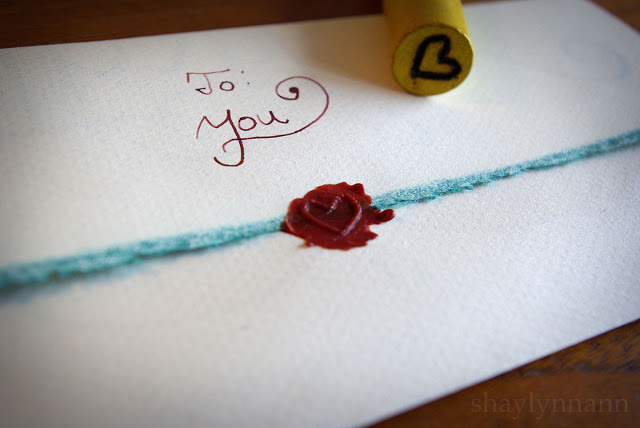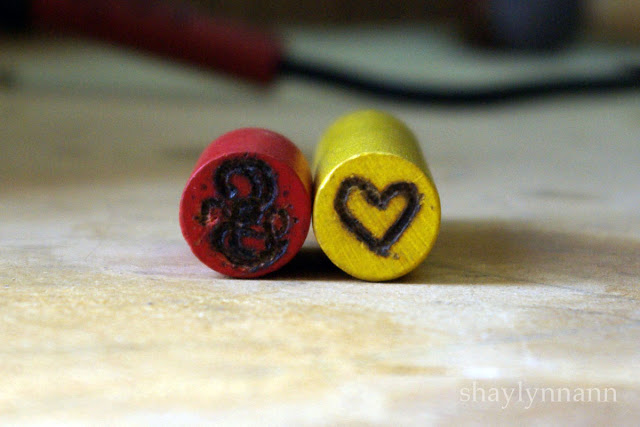|
The Breadcrumbs widget will appear here on the published site.
The Art of Using Melted Candle StuffToday I stepped out of my comfort zone and made a video tutorial! I just snapped a few pictures as I worked, so the video is probably more illuminating: I've always loved writing letters and have often dreamed of the days of yore when people sent letters calligraphied on parchment, sealed with wax. There's something so romantic about it. Then, after I made the blog post about glass nib pens, I just had to get a wax seal kit. I bought some sealing wax but didn't want to spend $20 or more on a stamp that I would only use when sending those long, rare, handwritten letters, so I decided to make my own. I tried using buttons as a stamp but we didn't have any pretty ones that worked, and I wanted to make my own cool design. Several months ago I saw this Pin and memorized the steps from the photos. I just spent a couple of minutes searching, and it looked like this idea originated from this post on a design blog called RageHaus. Anyway, here's my spin on the DIY wooden sealing wax stamps. You will need:
A wooden dowel or block A woodburner / pyrography wand A dremel tool Oil Sealing wax Approx. 45 minutes Above you can see my first attempt at making a wax stamp (the red stamp with the monogram 'S'). I was really pleased with how it turned out, especially considering the complexity of the design! For this tutorial I made a very basic heart stamp. It's a lot easier than it looks! To begin, you'll need a circular wood dowel. I used a block from one of those ubiquitos toy block sets. Draw the design that you want on the dowel. Remember, your image will be reversed when stamping. For the heart, it doesn't matter, but for the monogram, I freehanded a mirror image. If you don't like mirroring or drawing things without a reference, you can print out a reverse image and transfer the picture onto the wood. Next, use the pyrography tool to burn the wood. Begin by simply using the smallest tip to slowly, slowly trace the design. After the initial burn, press down the the tool (it's best if you do this using the side of the tool, not just the tip) to deepen the valleys. It needs to be deep enough for the wax design to stand out clearly. Do your best to not just push a bunch of dots into the wood, as this will make the final design very bumpy. Pro tip: If your design starts getting really bumpy, use a small flathead screwdriver to push the bumpy wood down flat. You want everything to be level—unless you want a design with varying heights, such as my monogram, where I carved the main letter deeply but made the swirlies much lighter. Also, if your wooden block is covered with paint like mine, and it smells really foul while burning it, you can always put on a mask. I wound up doing that because the smell made me queasy, so just watch out. You're not done yet! The design needs to be sanded to make it flat and even. If you sand it well enough, the wax will not stick to the wood. Use a fine nib dremel tool to do this. Ta-da! The design is finished, and all that remains is to dip the tip in oil and wipe off the excess (to discourage the wax from sticking to your stamp). Then it's time to test out your new toy. I just wanted to send a little shout-out to GreenCraftStore, where I bought the wax. Their pieces were reasonably priced and just look at that beautiful packaging. I'm not really an expert on stamping with wax, as the first time I did it was when I made the monogram stamp, but here are a couple of tips: 1. Don't catch the paper on fire if you are using a wax stick with a wick. Do, however, get really excited that you are holding a flame and dripping really really really hot wax on paper. It's cool. 2. Let the wax dry for just a couple of seconds before imprinting it with the stamp. 3. Let the wax dry with the stamp ontop of it, then wiggle the stamp off. 4. If you are going to mail this, use modern plastic waxes that won't break in the mail. I used beeswax, which is great for historical accuracy. However, historically seals were used not only as a sort of signature but also to keep prying eyes off of letters. If a seal was fiddled with, it would crack. I think that beeswax probably won't survive modern mail machines. I've yet to test it out, though! Ahhh! It WORKED. Ignore the cheesy "To: You"—I needed something to quickly write on the sheet of paper and "To: You Lovely Blog Readers and YouTube Followers and The Random Person Who Just Stumbled Upon This Video and/or Blog Post" would have taken too long to write. CommentsComments are closed.
|
|









